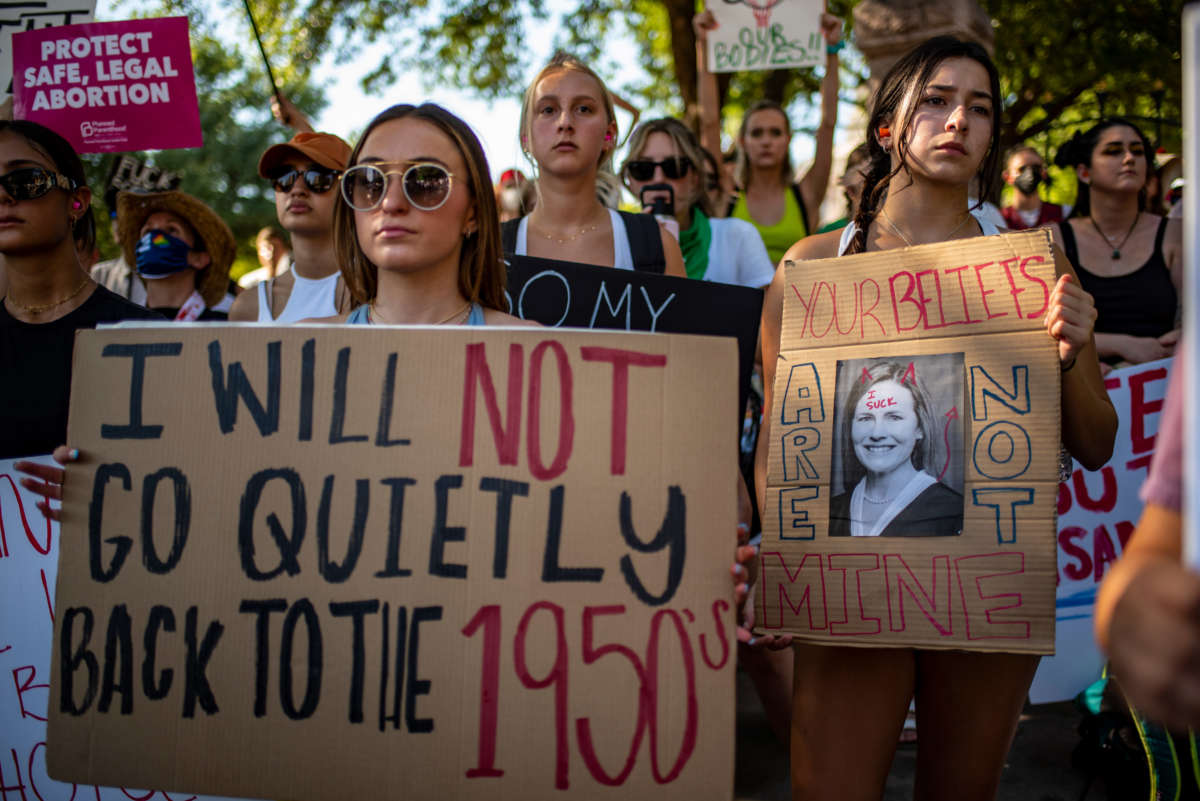Idaho, Oklahoma, Tennessee and Texas will begin enforcing near-total abortion bans Thursday, and a fifth state — North Dakota — is set to do so Friday. By the end of the week, 12 states will have outlawed abortion in almost all instances.
Abortions were legal in three of those states before this week, though they were difficult to obtain. After Roe v. Wade was overturned June 24, ending the federal right to an abortion, Idaho and Tennessee began enforcing six-week bans. Until Friday, abortion is legal in North Dakota up until 22 weeks of pregnancy, but the state’s sole clinic has already moved across the Red River, relocating in neighboring Minnesota. Oklahoma and Texas have already begun enforcing laws banning abortions, but the laws taking effect Thursday add new legal punishments for people who provide the service.
The laws mark a new phase in the post-Roe world. All but Oklahoma’s bans are so-called trigger laws — state abortion bans that were crafted in anticipation of the Supreme Court eliminating federal abortion rights, which it did in its Dobbs v. Jackson Women’s Health Organization decision. Some of these laws were written to take effect 30 days after the Supreme Court issued its judgment in the case, a formality that occurred July 25. North Dakota’s ban required the attorney general to certify that Roe had been overturned — which he did June 28 — but a state judge intervened to delay enforcement until this Friday.
Oklahoma’s latest ban, Senate Bill 612, was passed this spring as part of a wave of anti-abortion laws erected in anticipation of the Dobbs decision. That ban made performing an abortion a felony, with a punishment of up to 10 years in prison and a fine of $100,000. Texas’ trigger law also makes performing abortion a felony and includes a fine of $100,000 per abortion performed.
Beyond the dozen states banning abortion, three others — Ohio, Georgia and South Carolina — are enforcing laws that ban abortion after six weeks of pregnancy. Florida is enforcing a 15-week ban, and in Utah, abortions are banned after 18 weeks of pregnancy.
Tennessee’s ban has added to a regional abortion desert in the Southeast. Now, people seeking abortions in the South have few options — they can travel to North Carolina, Illinois or Indiana (where an abortion ban takes effect September 15). People who are under 15 weeks can also travel to Florida.
Already, clinics in these states have made plans to cease operations and, in some cases, relocate to other states. CHOICES, which operated a Memphis clinic, is establishing a new facility in Carbondale, Illinois, in an effort to help provide for some of the patients who may now be traveling to the state, which is emerging as an abortion haven. Planned Parenthood’s Tennessee clinics are no longer providing abortions. The Knoxville Center for Reproductive Health, an independent abortion clinic, has permanently closed. As of Wednesday, only one independent clinic in Tennessee — Carafem, just outside of Nashville — was still providing abortions.
The Department of Justice has sued to challenge Idaho’s trigger ban, which allows abortions only in cases of rape, incest or if the life of the pregnant person is at risk. (Such exceptions are typically difficult to enforce or qualify for.) A judge ruled Wednesday in the federal government’s favor, blocking any provisions of the law that might be used to ban abortion in emergency room settings. That came a day after a Texas judge ruled against the government on the same issue.
The decision in Idaho, however, does not allow for clinic-based, non-emergency abortions, said Rebecca Gibron, CEO of Planned Parenthood Great Northwest, Hawaii, Alaska, Indiana, Kentucky. That means that Idaho’s remaining two abortion clinics, both operated by Planned Parenthood, will no longer be providing the service.
Instead, people seeking abortions will now have to travel out of state, likely to neighboring Oregon and Washington, a journey that can span hundreds of miles each way, in often mountainous terrain that can be difficult to drive, Gibron said. Sometimes, the interstate connecting Idaho is closed completely for snow.
“There’s always been barriers to abortion care in Idaho,” Gibron said. “Adding in this component where abortion is banned in the state really exacerbates the serious challenges people are going to be facing.”
Already, Idaho’s six-week ban has put a crunch on abortion access. People from eastern Oregon previously might have gone to an Idaho clinic. But now, they and Idaho residents are traveling west to access abortions, said Anne Udall, president and CEO of Planned Parenthood Columbia Willamette, in Oregon. Last week, she added, one patient took a $1,200 taxi from Boise, Idaho, to the closest clinic she could find, three and a half hours away, in Bend, Oregon. Planned Parenthood will reimburse her for the cost of the cab, Udall said.
“Just really understanding the impact of what is happening to individuals is really important,” she said. “If people don’t have resources we want them to know they are out there.”
Trump is silencing political dissent. We appeal for your support.
Progressive nonprofits are the latest target caught in Trump’s crosshairs. With the aim of eliminating political opposition, Trump and his sycophants are working to curb government funding, constrain private foundations, and even cut tax-exempt status from organizations he dislikes.
We’re concerned, because Truthout is not immune to such bad-faith attacks.
We can only resist Trump’s attacks by cultivating a strong base of support. The right-wing mediasphere is funded comfortably by billionaire owners and venture capitalist philanthropists. At Truthout, we have you.
Our fundraising campaign is over, but we fell a bit short and still need your help. Please take a meaningful action in the fight against authoritarianism: make a one-time or monthly donation to Truthout. If you have the means, please dig deep.
